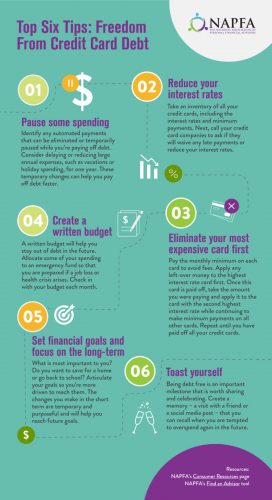Tips for Reducing Credit Card Debt – NAPFA Financial Advisors
For many Americans, a boost in holiday spending on top of already rising levels of credit card debt means starting out the new year deep in the red.
According to Magnify Money analysis, approximately 125 million Americans hold credit card debt. Total credit card debt in the United States is $527 billion, and this debt is expected to become costlier in 2018 as the Federal Reserve’s continued interest rate hikes ripple through the economy.

NAPFA Tips on Reducing Credit Card Debt (PRNewsfoto/NAPFA)
“With unemployment on the decline and credit card interest rates on the rise, now is the right time to get rid of credit card debt once and for all,” says Geoffrey Brown, CEO of the National Association of Personal Financial Advisors (NAPFA). “For a financial advisor, one of the first steps in working with a new client is tackling unnecessary debt to free up money for savings. These tips from our advisors are a good blueprint for anyone who is looking to live debt free in 2018.”
Tip #1: Pause some spending
Identify any automated payments that can be eliminated or temporarily paused while you’re paying off debt. Consider delaying or reducing large annual expenses, such as vacations or holiday spending, for one year. These temporary changes can help you pay off debt faster.
Tip #2: Reduce your interest rates
Take an inventory of all your credit cards, including the interest rates and minimum payments. Next, call your credit card companies to ask if they will waive any late payments or reduce your interest rate.
Tip #3: Eliminate your most expensive card first
Pay the monthly minimum on each card to avoid fees. Apply any left-over money to the highest interest-rate card first. Once this card is paid off, take the amount you were paying and apply it to the card with the second highest interest rate while continuing to make minimum payments on all other cards. Repeat until you have paid off all your credit cards.
Tip #4: Create a written budget
A written budget will help you stay out of debt in the future. Allocate some of your spending to an emergency fund so that you are prepared if a job loss or health crisis arises. Check in with your budget each month.
Tip #5: Set financial goals and focus on the long-term
What is most important to you? Do you want to save for a home or go back to school? Articulate your goals so you’re more driven to reach them. The changes you make in the short term are temporary and purposeful and will help you reach future goals.
Tip #6: Toast yourself
Being debt free is an important milestone that is worth sharing and celebrating. Create a memory – a visit with a friend or a social media post – that you can recall when you are tempted to overspend again in the future.






